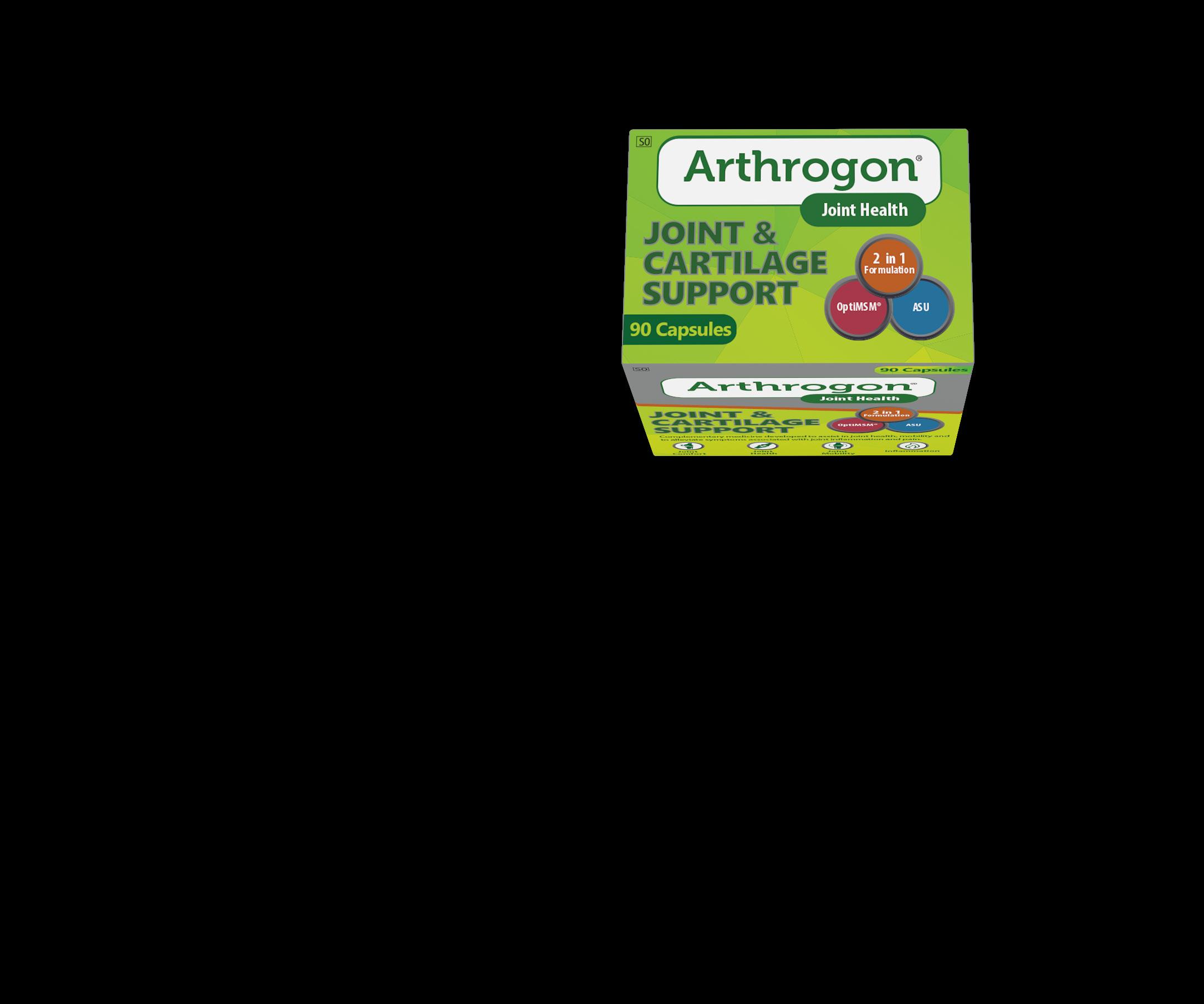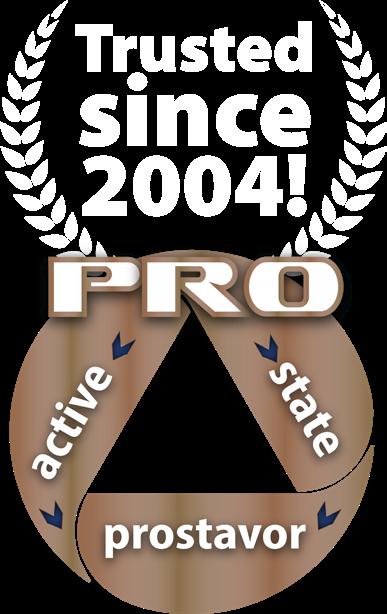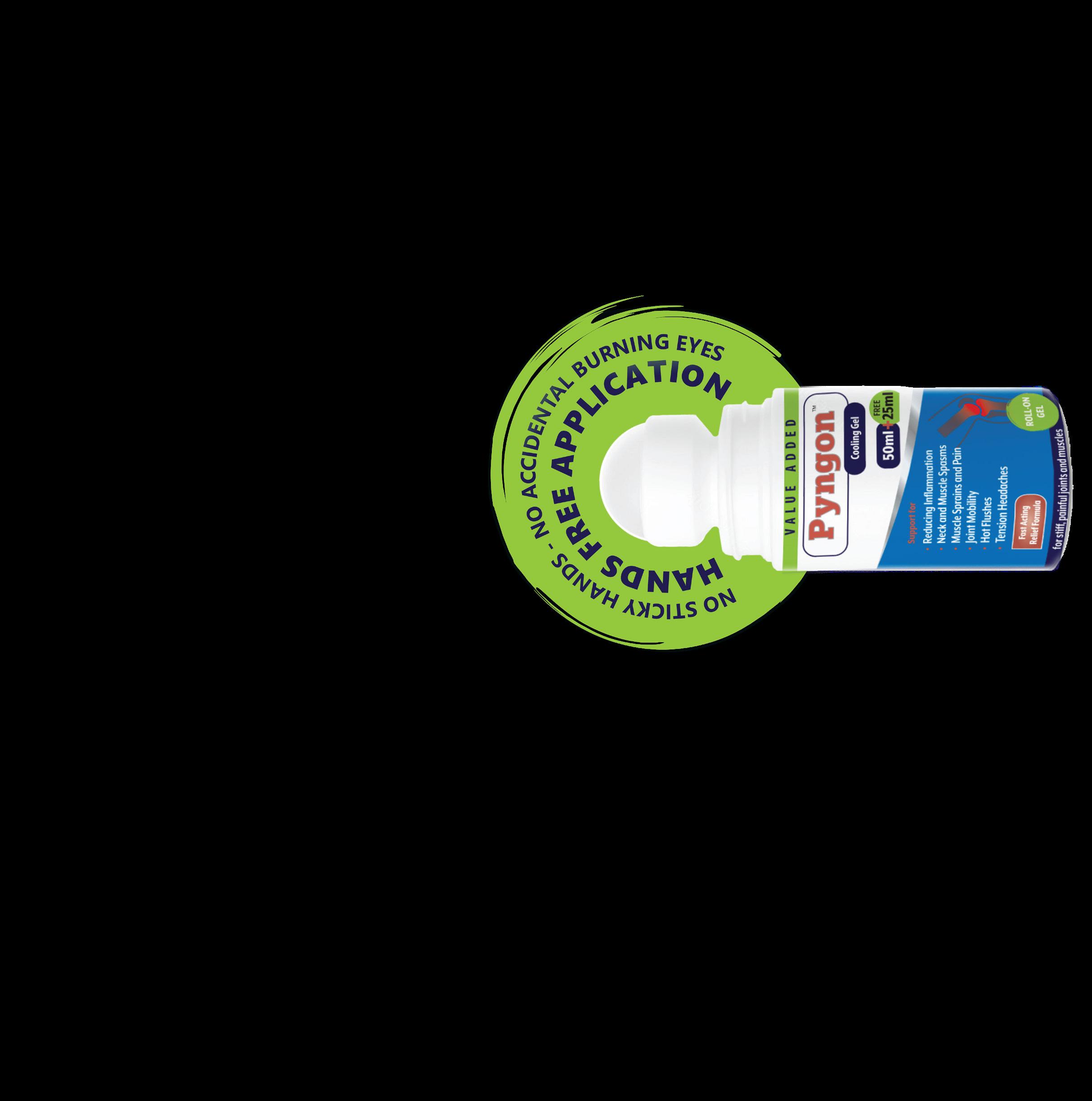Information Catalog









Arthrogon™ was clincally developed to provide support for the treatment of Rheumatoid/Osteo Arthritis and for associated joint inflammation and pain. Arthrogon™ has a unique combination- it contains 2 clinically proven ingredients in optimum dosages in accordance with the international dietary indicators and has also been clinically proven to be safe for dietary consumption.

Osteoarthritis is a disease that is painful and life-altering that limits the daily activities of many individuals worldwide (Christiansen, Bhatti, Goudarzi, & Emami, 2015). With obesity becoming more prevalent and the world’s population living longer, the prevalence of Osteoarthritis is likely to increase dramatically in the coming decades (Christiansen, Bhatti, Goudarzi, & Emami, 2015). Osteoarthritis is a joint disease where there is progressive damage of articular cartilage and new bone formation as well as inflammation and fibrosis of ligaments and tendons (Christiansen, Bhatti, Goudarzi, & Emami, 2015). Rheumatoid arthritis is a type of arthritis that primarily effect the joints of the hands and feet- it causes inflammation and destroys local articular structures (Firestein, 2003) ASU and Opti-MSM have properties that can help aid in the effects of osteoarthritis and rheumatoid arthritis and ease the pain experienced due to arthritis.

The recommended dosage is to take 2 capsules daily in the morning and 1 capsule in the late afternoon or early evening before or after a meal with at least 300ml water.
ASU is made up of vegetable extracts made from fruit and seeds of avocado and soybean oil and is mainly prepared in ratio of 1:2 (Avocado to Soy) (Salehi, et al., 2020). The proprietary blend consists of physterols from avocado and soy unsaponifiables, including beta-sitosterol, stigmasterol, and campesterol (Christiansen, Bhatti, Goudarzi, & Emami, 2015). The main isoflavones in soy are genistein and daidzein (Poschner, et al., 2017). ASU has been seen to reduce pain symptoms, showing improvements in the movement of joints in patients with arthritis (de Paula, et al., 2018). Furthermore, ASU has shown to reduce arthritis injuries in patients as well as promoting bone repair (de Paula, et al., 2018).
In a review that focused on ASU as a treatment for Osteoarthritis- it was concluded that ASU reduces pain and stiffness within joints, prevent cartilage degradation and stimulate collagen synthesis (Christiansen, Bhatti, Goudarzi, & Emami, 2015). This is possible as ASU has chondroprotective, anabolic and anticatabolic properties and modulates osteoarthritis pathogenesis by preventing several molecules and pathways involved in osteoarthritis. The anticatabolic properties of ASU prevent cartilage degradation by inhibiting catabolic enzymes. Furthermore, ASU stimulates the synthesis of collagen and aggrecan by preventing inflammatory cytokines- this is due to ASU anabolic properties (Christiansen, Bhatti, Goudarzi, & Emami, 2015). Chondroprotective effects are facilitated by adjusting growth factor abnormalities, increasing TGF-β, and decreasing vascular endothelial growth factor (VEGF) in synovial fluid. ASU also inhibits cholesterol absorption and endogenous cholesterol biosynthesis, which helps reactive oxygen species pathology in chondrocytes (Christiansen, Bhatti, Goudarzi, & Emami, 2015).
ASU has been increasingly recommended as adjuvant treatment for osteoarthritis pain and as symptomatic slow -acting treatment for osteoarthritis specifically present in the hip and knee (Salehi, et al., 2020). Furter studies have also confirmed the potent anti-inflammatory properties of ASU as well as the antioxidant and analgesic activity (Lippiello, Nardo, Harlan, & Chiou, 2008)



Methylsulfonylmethane (MSM) is a naturally occurring organosulfur compound with broad biological properties (Butawan, Benjamin, & Bloomer, 2017). MSM has been investigated for its many purposes such as its anti-inflammatory and antioxidant capabilities (Butawan, Benjamin, & Bloomer, 2017). It has been extensively investigated and has seen to improve inflammation, joint and muscle pain, oxidative stress, and serve as a powerful antioxidant (Butawan, Benjamin, & Bloomer, 2017).
MSM has been studied for the management of pain and function of patients with arthritis. Within a randomised trial, fifty men and women (between 40 -76 years of age) with knee pain due to osteoarthritis were randomly selected to either get 3g MSM twice daily (6g in total daily) or a placebo twice daily for 12 weeks (Kim, Axelrod, Howard, Buratovich, & Waters, 2006). Pain assessments were done and MSM compared to placebo showed a significant decrease in pain and physical function impairment as well as an improvement in performing daily activities compared to placebo (Kim, Axelrod, Howard, Buratovich, & Waters, 2006). Another study also showed that MSM is a safe, non-toxic substance to use for the control of arthritic pain (Lawrence, 1998). Within this study, 16 patients ranging from age 55 to age 78 who had degenerative arthritis and had pain ranging from 4 weeks to 6 months, were randomly selected to either take MSM or a placebo (Lawrence, 1998). The dose of MSM was 2250 mg daily (2 capsules in the morning and 1 after lunch) and a visual analogue scale was used to measure the patients’ pain levels at a 4 week and 6-week visit (Lawrence, 1998). The results indicated that those on MSM had a 60% pain improvement at the 4 weeks visit and 82% pain improvement at the 6-week mark (placebo were 20% and 18% respectively) (Lawrence, 1998).
The human absorption and biosynthesis of this compound depends on the cometabolism between microbiota and the host. Whether MSM is naturally produced or manufactured, it shows no biochemical differences in its ability to intermediate oxidative stress and inflammation. MSM is well tolerated for arthritis and several other conditions related to inflammation, physical function, and performance. Developing research suggests that MSM may one day aid in the treatment of various types of cancer (Butawan, Benjamin, & Bloomer, 2017). The dose of MSM (as specified by GRAS -generally recognized as safe) that is well-tolerated by most individuals is a dose of up to 4g a day (4000 mg) (Butawan, Benjamin, & Bloomer, 2017).



Prostavor® is a complementary medicine developed to promote general prostate health and assists in the treatment of symptoms associated with an enlarged prostate.

Studies have shown that the ingredients contained in Prostavor® can assist with a difficulty to pass urine, prevent frequent urination, boost the immune system, and may assist in controlling prostate enlargement.

All men above the age of 40 but in particular those who has symptoms related to an enlarged prostate such as :

• Pain or discomfort during urination
• Frequent urination
• Dripping after urinating
• Straining to pass urine
• Low sex drive and energy levels
• A sensation of the bladder not being empty after urination
INGREDIENTS:
(Each tablet contains)
Calcium Carbonate (equivalent to 250 mg elemental Calcium) 600 mg
Magnesium Glycinate (equivalent to 35 mg elemental Magnesium) 175 mg
Vitamin D3 500 iu
Ascorbic Acid (Vitamin C) 25 mg
Vitamin K2 as Mena Q7 4.5 mg
Zinc Gluconate (equivalent to 1 mg elemental Zinc) 8.4 mg

Manganese AAC 10% (equivalent to 1 mg elemental Manganese) 10 mg
Osteovex™ was developed to assist in the treatment of osteoporosis and acts as a prophylactic for early onset osteoporosis by combining a blend of well documented ingredients which have shown to:

• Promote bone density

• Maintain healthy bone function and density
• Reduce lower grade inflammation
• Reduce the risk of hairline fractures caused by minor injuries



Butawan, M., Benjamin, R., & Bloomer, R. (2017). Methylsulfonylmethane: Applications and Safety of a Novel Dietary Supplement. Nutrients, 3(290). doi:10.3390/ nu9030290
Christiansen, B., Bhatti, S., Goudarzi, R., & Emami, S. (2015). Management of Osteoarthritis with Avocado/ Soybean Unsaponifiables. Cartlidge, 6(1), 30-44. doi:10.1177/1947603514554992
de Paula, L., Lopes de Oliveira, G., Pinotti, F., Grecchi, B., de Aquino, S., & Chierici Marcantonio, R. (2018). Effect of Avocado/ Soybean Unsaponifiables (ASU) on Osseointegration in Rats with Experimental Arthritis. The International Journal of Oral & Maxillofacial Implants, 33(3), 603-612. doi:10.11607/ jomi.6124
Firestein, G. (2003). Evolving concepts of rheumatoid arthritis. Nature, 423(6937), 356-361. doi:10.1038/nature01661
Kim, L., Axelrod, L., Howard, P., Buratovich, N., & Waters, R. (2006). Efficacy of methylsulfonylmethane (MSM) in osteoarthritis pain of the knee: a pilot clinical trial. Osteoarthritis and cartilage, 14(3), 286-294. doi:10.1016/j. joca.2005.10.003

Lawrence, R. (1998). Methylsulfonylmethae (MSM): A double blind study of its use in degenerative arthritis. Journal of Equine Veterinary Science, 7(2).
Lippiello, L., Nardo, J., Harlan, R., & Chiou, T. (2008). Metabolic Effects of Avocado/Soy Unsaponifiables on Articular Chondrocytes. Evidence- Based Complementary and Alternative Medicine, 5(2), 191-197. doi:10.1093/ecam/ nem132
Poschner, S., Maier-Salamon, A., Zehl, M., Wackerlig, J., Dobusch, D., Pachmann, B., & Sterlini, K. J. (2017). The Impacts of Genistein and Daidzein on Estrogen Conjugations in Human Breast Cancer Cells: A Targeted Metabolomics Approach. Frontiers in Pharmacology, 8(699). doi:10.3389/ fphar.2017.00699

DB Pharmaceuticals is a registered, Grade A certified pharmacy under the South African Pharmacy Council (SAPC) – with registration number Y60310.



We are fully compliant with the current South African Health Products Regulatory Authority (SAHPRA) and the Medicines and Related Substances Control Amendment Act, No. 19 of 1976 requirements for Category D – Complementary Medicines.
DB Pharmaceuticals welcomes SAHPRA’s approach to regulate the manufacture and sale of Complementary Medicines and Health Supplements which we believe will result in a safer, more efficient experience for patients who seek quality natural
The manufacturing facility is licensed with the South African Health Products Regulatory Authority (SAHPRA) which is only granted after a positive GMP inspection by the regulator.
The manufacturing plant is further accredited by the South African Pharmacy Council as a pharmacy owner, grading certificate Grade A, and recording of a pharmacy.
Certification of the manufacturing plant also includes a Department of Health Manufacturing Pharmacy certificate and a Certificate of Acceptability for Food Premises and is registered with the South African National Department of Health.
All our products old and new have been developed by our two in-house responsible pharmacists who have 37 years of experience between them.
Once products and formulations have been researched and developed the formulation is sent to our team of specialist formulary pharmacists at the manufacturing site who review and test formulations against recent research to ensure safety,
36 Sovereign Drive, Route 21 Corporate Park, Irene, Centurion Gauteng, South Africa 0062 info@arthrogon.co.za www.arthrogon.co.za Helpline: 012 111 8313 Like


